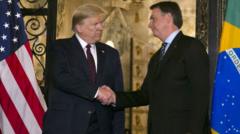Are Trump's Tariffs on Brazil Just Political Retaliation?

Understanding the Implications of the US Tariff Hike on Brazil
In recent months, the relationship between the United States and Brazil has become increasingly strained due to escalating tariff policies. Initially, Brazil was subjected to a modest 10% tariff on goods imported to the US. However, this rate has surged to an astonishing 50% as the Trump administration responds to political tensions surrounding former Brazilian President Jair Bolsonaro. This article dives into the implications of these tariffs, the political motivations behind them, and how they could affect both nations economically and socially.
Political Background: The Bolsonaro Factor
The new tariff regime is deeply intertwined with the ongoing political saga in Brazil. Former President Jair Bolsonaro, an ally of Donald Trump, has faced significant legal challenges since losing the 2022 presidential elections. He has been accused of attempting a coup following the storming of government buildings by his supporters, leading to an investigation led by Brazilian Supreme Court Justice Alexandre de Moraes. Bolsonaro's supporters view Moraes as an authoritarian figure, while others see him as a defender of democracy.
The timing of the tariff hike coincides with the US administration's growing frustration toward Brazil's judiciary and its perceived interference in political matters. Trump’s administration has framed these tariffs as a reaction to what it describes as "politically motivated persecution" against Bolsonaro, which is further complicated by Moraes' rulings affecting social media accounts linked to the former president.
The Economic Landscape: Tariffs and Trade Deficits
Contrary to Trump's claims of a trade deficit with Brazil, the US actually enjoys a significant trade surplus. American exports to Brazil often surpass imports, with key exports including machinery, aircraft, and agricultural products. The new 50% tariff on Brazilian goods, particularly in sectors like beef, coffee, and steel, raises serious questions about the economic repercussions of this trade war.
Impact on Brazilian Exports
Brazil's economy heavily relies on exports, especially in agriculture and raw materials. Key products such as coffee and orange juice hold substantial market shares in the US. For instance, the US imports approximately one-third of its coffee and more than half of its orange juice from Brazil. The sudden tariff hike will likely result in increased prices for American consumers and may force Brazilian producers to absorb costs, leading to potential losses.
- Beef: Brazil is one of the largest exporters of beef to the US. The new tariffs could significantly impact prices and availability in American markets.
- Coffee: With the US as Brazil's largest coffee customer, the 50% tariff is expected to lead to significant price hikes.
- Steel: As a key supplier of steel, Brazil's steel industry could face severe consequences due to the elevated tariffs.
Domestic Reactions in Brazil
In response to the tariffs, Brazilian President Luiz Inácio Lula da Silva has expressed defiance, labeling the US actions as unacceptable foreign interference. Lula's administration has made it clear that while they remain open to negotiations, they are also preparing to implement measures to protect Brazilian workers and businesses. This assertive stance has garnered him a boost in domestic approval ratings, showcasing how international tensions can sometimes lead to increased national unity.
Lula’s strategy appears to be twofold: he aims to safeguard Brazil's economic interests while also maintaining a strong political front against perceived foreign meddling. The impact of these tariffs could be a double-edged sword, potentially rallying support for Lula’s government even as it navigates a challenging trade landscape.
Looking Ahead: The Potential for a Trade War
The question remains whether Brazil will retaliate against the US tariffs, turning this dispute into a full-blown trade war. Economic experts warn that such a scenario could have dire consequences for both nations. Brazil could seek alternative markets, but analysts assert that finding new buyers for its vast agricultural exports will take time and may not offset immediate losses from the US market.
Possible Retaliatory Measures
Should Brazil choose to respond with its own tariffs or trade restrictions, the fallout could escalate tensions further. Potential measures may include:
- Imposing tariffs on American agricultural products.
- Restricting imports of US goods that compete with Brazilian products.
- Leveraging Brazil's position within regional trade agreements to isolate US interests.
Long-Term Economic Implications
The long-term economic implications of these tariffs could reshape trade relations between the two countries. For the US, consumers may face higher prices as companies pass on increased costs. Conversely, Brazil's exporters could struggle to maintain their foothold in key markets without the US. This could lead to a significant reallocation of resources and necessitate strategic pivots in both economies.
Conclusion: Navigating Uncertain Waters
As the situation unfolds, both Brazil and the United States find themselves at a crossroads. The tariffs are not merely economic measures; they carry significant political weight that reflects the current climate of international relations. With Lula maintaining a strong stance against foreign interference and Trump remaining resolute in his approach, the path forward remains unclear. Both leaders have powerful supporter bases that will demand action as this trade dispute evolves.
As we wait to see how this situation develops, the potential for long-lasting economic and political consequences looms large. Will Brazil and the US find a way to negotiate a peaceful resolution, or are we witnessing the beginning of a more profound trade conflict? Only time will tell.
FAQs
What prompted the increase in tariffs on Brazilian goods?
The tariffs were raised due to political tensions surrounding former Brazilian President Jair Bolsonaro and his ongoing legal battles, which the Trump administration views as politically motivated persecution.
How will these tariffs affect American consumers?
American consumers can expect higher prices for Brazilian goods, such as coffee and orange juice, as companies may pass on increased costs due to the 50% tariff.
What is Brazil's response to the new tariffs?
President Luiz Inácio Lula da Silva has expressed strong opposition to the tariffs, calling them unacceptable foreign interference, and has indicated that Brazil is prepared to take measures to protect its economy.
In this complex geopolitical landscape, both Brazil and the United States must navigate their interests carefully. As tensions rise, how will each nation adapt to these challenges? #TradeWar #BrazilUSRelations #EconomicImpact
Published: 2025-07-31 07:49:14 | Category: wales



